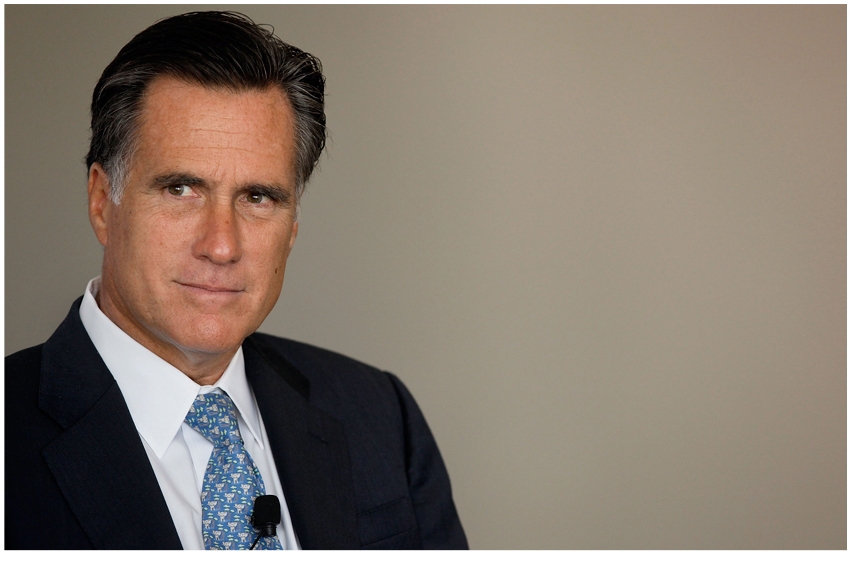It can be odd to read a biography of a major political figure for whom, every day while one reads it, the story continues. Everything we hear in the news now about Mitt Romney seems to have been the case in 2008, when he first ran for president; or 2002, when after leading the Olympic Games in Salt Lake City he returned to Massachusetts and became governor (still the only election he has won); or even 1994, when his political career began with a race for US Senate against Ted Kennedy, to whom he delivered a few scares before losing comfortably, 41-58.
Still the question of authenticity — what does Mitt believe? — dogs him; still the question of whether he is really an anti-abortion, gay-unfriendly, social conservative; still the question of whether he can connect with ordinary citizens who grew up without his many advantages, and who never hoped to earn even a sliver of his $250-million fortune. As voters, we’re still asking about the morality of Mitt’s long career in private equity, and whether his deals at Bain Capital made jobs or destroyed them, knowing that either way the scale was huge; the subject of Newt Gingrich’s TV adverts just weeks ago in South Carolina is the same as Ted Kennedy’s two decades ago.
We’re still perplexed about Mitt’s Mormonism, the faith itself and the immense role it has played in his private and family life, and whether a former bishop and Boston stake president, who has tithed millions to his church, can be truly independent of the rigid, closed, male, unreformed hierarchy in Salt Lake City.
And still — returning to the matter of authenticity — we’re amazed at Mitt’s capacity for talking unprompted rubbish. In the 2008 campaign, this obvious non-hunter spoke of shooting ‘small varmints’ and cited his father, a brave and progressive figure in 1960s Republican politics while governor of Michigan, marching with Martin Luther King when he hadn’t; in 2011 the graduate of Harvard Business School, who went straight into consulting, spoke of his ‘entry-level’ job and fear of getting ‘a pink slip’, i.e. being sacked.
So the time is never better for a book called The Real Romney, by two Boston Globe journalists, Michael Kranish and Scott Helman, whose edifice is built — as they happily concede — on the work of dozens of their Globe colleagues in the past 20 years. There is fresh interviewing, with sources both named and anonymous and including many of Romney’s close associates and friends; but apart from that, the book is entirely produced from the archive of the hometown newspaper that has followed him closest and longest.
The disappointment, perhaps, is that when US politics is generally sordid and notable for buffoonery, the book is so fair-minded and polite; and that far from being a fool or charlatan Romney is confirmed as an intelligent, decent and generous man although — and this is his tragedy — without the guts, principle and consistency of his father George, that doomed Michigan governor who, Kranish and Helman show us, was such an extraordinary presence in Mitt’s life and even now after death remains his guiding spirit.
Since so much in The Real Romney reminds us that what happened before has happened again, then once more, it may be worth identifying an unstated but omnipresent possibility that, although it hasn’t yet occurred, Romney’s becoming president of the United States will still seem familiar to the American electorate. That’s the image of the aloof president who doesn’t like, and does his best to avoid talking to, legislators; who prefers to move the debate via the grandly-staged speech rather than backroom give-and-take—the ‘transactional culture,’ the authors describe it — of regular politics.
For all the talk in America of whether Romney is like John Kerry or Al Gore (remote, patrician, risible), he may be more like his fellow Harvard Law School alumnus, the incumbent Barack Obama. Which makes it even better that the signature achievement they share is transformational health care reform, which, as much as Romney denies it, springs almost entirely, at the national level, from his pioneering Massachusetts legislation of 2006, a process exceedingly well described by Kranish and Helman.
All three, now four, of Romney’s campaigns have been about what his message should be, in a sentence, and can he stick to it. Fortunately, the candidate is confident: ‘I’m very happy with where I am,’ he said last year, ‘and the things I believe’ — a remark that, in one of the authors’ judicious phrases, ‘implies that conviction is a destination.’ Romney doesn’t need this job, and he doesn’t seem to be power-mad; so why does he run?
He might actually believe he has something to offer. Of his career in capitalism he says: ‘We were looking for troubled companies’ — sounds like troubled countries! — ‘businesses that were not performing as well as we think they could’. For the authors, his true operating space or comfort isn’t ‘whether an idea would pan out but whether the numbers worked’.
This is the real, public Romney, and the question everyone asks is whether the approach and temperament contained in these sentences is suitable for national leadership. About the only recent politician to whom Romney hasn’t been tied is a predecessor as Massachusetts governor, Michael Dukakis, who ran an uninspiring campaign against the first George Bush on ‘competence’ and sound management. The experience of modern American elections suggests that this is never enough.






Comments